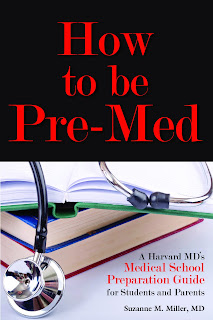For over a decade, I have advised pre-meds on how to
maximize their chances of getting into medical school. During this time, as I witnessed
thousands of anxiety-ridden pre-meds wade doggedly through the murky waters of
medical school admissions, I have noticed pre-med difficulties often pale in
comparison to those of pre-meds parents. It’s often much easier to be the
athlete on the field than the coach on the sidelines. And so it goes with
premeds and their parents.
My parents, a systems engineer and English teacher, knew
little of the pre-med process. Taking a year “off” post-college, I lived at
home while performing health policy research and applying to medical school.
Despite their lack of expertise in medical school admissions, my parents
thanklessly copy edited my application, served as sounding boards for secondary
essay topics, and peppered me with practice interview questions. All the while,
I stormed about the house in an anxious funk, snapping every time my parents
asked if any news had arrived about interviews or acceptances. There was even a
visit to the emergency department for stress-induced palpitations. It was not a
pleasant time.
Though parents should feel no obligation to help their
pre-med child get into medical school (it really is the pre-med’s
responsibility), there are multiple tactics parents can take to maintain family
harmony, ward off feelings of helplessness, and improve a pre-meds chances of
achieving the dream of doctorhood:
Start Early
From the minute pre-meds step foot in college their actions
will be subject to scrutiny in one of the most competitive and complex of all
graduate school admissions processes. Over 40,000 pre-meds apply to medical
school each year with less than half gaining admission. Every grade, including
study abroad courses, are “counted” by the American Medical College Application
Service (AMCAS), creator of medical school’s primary application. Thus, there
is little room for the traditional slump in grades freshman year while pre-meds
ward off the transition blues. Further, pre-meds need more than stellar academics
to get in. Medical schools are looking for well-rounded students, and rightly
so. Great doctoring depends as much on interpersonal and leadership skills as
on academic prowess. Given the rigorous nature of pre-med requirements, it’s
important to start early and plan how to fit in academic, research, community
service, extracurricular, and clinical experiences. I don’t want parents
creating day-to-day schedules for their pre-med children. But I do suggest helping
with a broad timeline starting freshman year allowing a pre-med to see how all
of the prerequisites can be fit in by doing what one loves and doing it well.
Get Informed
In order to help make an effective timeline, a pre-med
parent needs to understand the intricacies of pre-med requirements. Many
universities provide online resources through the pre-health advising office
that serve as an excellent starting point. Then I suggest reading some of the
many books written by admissions experts listed in
Amazon’s Medical School
Guides section. Pick up a book with the goal of learning the pre-med
requisites and admissions process details. Then hand the book to your pre-med.
Further, you can skim through the many website, blogs, and forums dedicated to
helping pre-med students. But be aware that many of these sites, particularly
the forums, are unregulated and contain misleading information. I beg my
pre-meds to stay off forums not actively monitored by an expert, as such
mediums tend to be sources of increased anxiety. As the time to apply nears,
visit the
AMCAS website,
which has an excellent instruction manual and frequent asked questions section
dedicated to the next application cycle.
Avoid Nagging
One of the greatest difficulties faced by pre-med parents is
becoming the dreaded nag. Pre-meds often need a gentle push to get going on a
research project or start writing the application personal statement, but
remember that becoming a physician requires intense self-motivation. Perhaps a
pre-med dragging academically or in extracurriculars doesn’t really want to
enter medicine. I always tell my pre-meds to only become a doctor if they can
think of doing nothing else. Pre-med parents certainly want to avoid nagging a
child into a profession that will not bring a lifetime of joy.
Ask for Help
Even after a pre-med parent has started early, gotten
informed, and avoided nagging, there will still be many questions regarding how
to be pre-med and gain acceptance to medical school. The first stop for
questions should be the university’s pre-health department. This is how I
became involved in medical school admissions – I served as a pre-med tutor at
Harvard’s Eliot House and spent my days helping pre-meds get in. However, not
all universities have Harvard’s level of commitment to the admissions process.
Many pre-health advisors serve hundreds of students and simply don’t have the
time to provide individualized information. This has left the door open for
admissions consultants to provide targeted, personal help. A simple web search
reveals medical school admissions consultants of every expertise and price
level. There are even multi-day, intensive medical admissions bootcamps
dedicated to helping pre-meds gain acceptance to medical school. Premed parents
need not feel helpless; support is all around.
Though the pre-med process is arduous, understanding what is
required removes much of the stress surrounding being a pre-med and a pre-med
parent. Pre-meds should do more than just check the boxes in order to get into
medical school. As future physicians, they should embrace the beauty of
curiosity, joy of discovery, compassion for those in need, and satisfaction of
helping others. By following these tips, pre-med parents can guide their
pre-med and turn medical school preparation from a time of apprehension to one
of enlightenment.



